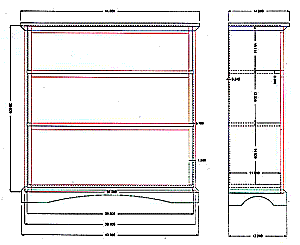
I’m fairly new to woodworking and enjoying making and designing cabinetry. Is there a software program that will help me with this? Currently I’m drawing my designs to scale on drafting paper, then figuring out a cutting list. I’ve looked into SketchUp, but it seems to have a steep learning curve. Any suggestions for any Mac (Apple) programs? Also, is there a list on a website of the dimensions for all the parts (cuts) for standard-size cabinets? – Dennis Sullivan
Rob Johnstone: While I am not an expert on design software, I think SketchUp is likely your best bet. I think there are some dedicated kitchen design software programs, but I’ve heard that they are pretty limiting (and, in truth, I have not used them). On the flip side, your learning curve for SketchUp could be offset by the rich amount of instructional material available. Also, there are free online libraries where you can grab other people’s drawings of hinges, doors, drawer slide hardware and so forth, and use them in your own designs. They are real timesavers. I found a couple of websites that have some reasonable dimensions for kitchen cabinetry, but I would personally recommend getting a book by Danny Proulx: Build Your Own Kitchen Cabinets. There you can find dimensions and advice. It is not a new book, but as a primer for designing kitchen cabinetry, it is very good.
Tim Inman: I’m an old guy and I love to use drafting tools and paper. I “think” better that way. I’m also a tech guy and I use computers a lot. So, I’m not anti-software. My personal experience, though, is this: unless you are going to do a lot of drafting via software, you’ll spend hours trying to figure out how to manipulate the programs and neglect the design essentials. For now, as you learn woodworking and seek to enhance your skills in that world, I would forego the additional learning curve of software mastery. Others will surely disagree. But pencils and paper and rulers and compasses are still viable tools in my world. There is so much to learn and know about good design. I heartily encourage you to spend your time studying the classic pieces and maybe even trying to reproduce them from available working drawings before you branch out into computer software. Software engineers are seldom furniture designers. They seem to me to be so “geeky” about how their software works they overlook the ultimate task it is seeking to accomplish — namely, the easy and efficient communication of good plans for good works.
Chris Marshall: While I agree with Tim that there’s nothing wrong with tried-and-true drafting tools and paper (they still work, after all!), I do think learning a woodworker-friendly software like SketchUp does make sense. Once you’ve got the basic skills down, the ability to render your drawings in three dimensions, rotate them, pull them apart, create cross-sections and build cut lists does save time. And, the basic version of SketchUp is free! It’s also easy to make changes to a drawing and print it out again, or even save old drawings and re-use components in future drawings — that’s tough to do if you’re drawing everything by hand and from scratch. So, if time is on your side, and you are patient, I suggest trying to learn SketchUp. Given the huge popularity of SketchUp, there are so many resources and user forums to help you. These days, I think it’s safe to say that SketchUp has become the woodworking choice for a CAD program.
And since Rob mentioned a cabinetry book, I’ll suggest another one I’ve found very useful in the past: Bob Lang’s The Complete Kitchen Cabinetmaker. Bob is a no-nonsense guy and an excellent woodworker with a background in cabinetry. The book is a straightforward and helpful read, covering all aspects of cabinet design and construction, plus style variations to consider. It’s definitely a good one to add to your library.





